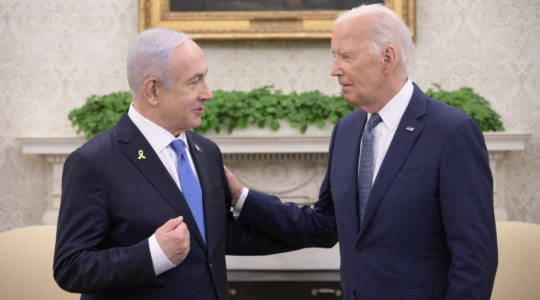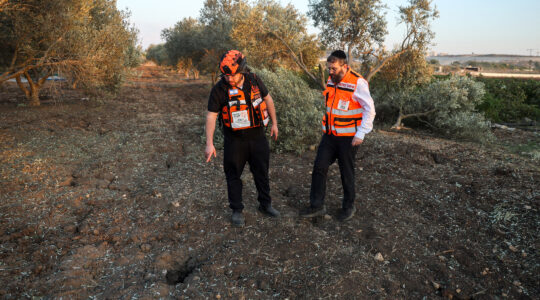JERUSALEM, Dec. 11 (JTA) — Increasingly alienated from the Jewish state in the wake of the recent Lebanon war, Israeli Arabs have produced a radical document demanding cultural autonomy and the right to veto government decisions that concern them.
The document, titled “The Future Vision of Palestinian Arabs in Israel,” could prove to be a watershed.
Drafted by representative mainstream organizations and not by extremists, it constitutes an unqualified rejection of the Zionist model of Israel as a Jewish state in which Israeli Arabs are integrated as equal citizens with full rights.
Instead, the document proposes a model of Israel as “the state of all its citizens,” in which two ethnic groups, Jews and Arabs, both enjoy a degree of autonomy in a binational state. That would be next to a Palestinian state in the West Bank and Gaza Strip that would be entirely Arab.
The rift between the Jewish majority and Arab minority in Israel has been widening steadily for years. Pre-existing tensions between the two communities were exacerbated by the Oslo process, the lethal clashes between Israeli Arabs and police in October 2000 and, most recently, by the second Lebanon war.
A last-ditch attempt by moderates on both sides to draft a conciliatory Jewish-Arab covenant collapsed in 2001. The protocols of their meetings, released recently, show that the main sticking point was the Arab side’s refusal to recognize Israel as a Jewish state.
The new document takes this rejection further. It has eight chapters dealing with sensitive issues like land policy, economic development, education and the nature of the Israeli state. The drafters do not recognize Israel’s essential Jewishness, and see it instead as a “joint homeland” for Jews and Arabs. That paves the way for the Arab side to demand not only individual rights but rights as a group.
From this basic position, the drafters derive their insistence on cultural, religious and educational autonomy. It also underpins their demands for separate representation in international forums and a veto right on domestic issues that concern them as a group.
The significance is far reaching: Israel would forfeit its Jewish character. Indeed, the drafters of the document urge Israel to forego its Jewish symbols of state — for example, the flag with the Star of David and the”Hatikvah” anthem, which expresses the Jewish yearning through the ages for a return to Zion.
The new document would seem to have widespread Israeli Arab support: It was drafted by the Supreme Arab Monitoring Committee and endorsed by the Arab Local Authorities’ Committee, two bodies that represent a wide spectrum of Israeli Arab opinion.
Many Israeli Jews were stung and deeply disappointed by the document. For them, the raison d’etre for the establishment of the state was to create a national homeland for the Jewish people. Few would be willing to consider, far less to discuss, forfeiting its Jewish character.
In a bitter article in Ma’ariv, journalist Dan Margalit captured the widespread frustration at the direction Israeli Arab thinking seems to be taking.
“It’s very sad and a great pity,” he wrote. “We were wrong to harbor illusions. They [Israeli Arabs] are impossible.”
Israeli intellectuals point out that if the thesis of a binational Israel were adopted, it would mean that in a two-state solution of the Israeli-Palestinian conflict — Israel and Palestine living side-by-side in peace — the Palestinians would have one-and-a-half states, the Jews only half a state.
Why are Palestinians entitled to full statehood and Jews not? they ask.
A recently published book, “Whose Land is This?” edited by veteran Ha’aretz columnist Uzi Benziman, tells another sad story: How leading thinkers on both sides, aware that Jewish-Arab relations were on a collision course, failed to formulate a common basis for dialogue and coexistence.
Between January 1999 and January 2001, 12 Israeli Jews led by Hebrew University Law Professor Mordechai Kremnitzer and eight Israeli Arabs led by Adel Manna, director of the Jerusalem-based Van Leer Institute’s Center for the Study of Arab Society in Israel, made a Herculean effort to draw up a Jewish-Arab covenant that would take the sting out of ties between the two communities.
Both sides showed goodwill and significant progress was made. But the Israeli Jews threw up their hands in despair when the Arab side refused to recognize Israel as a Jewish state, in precisely the same way as the drafters of the new document are refusing to do today.
Disillusionment about Jewish-Arab ties in Israel was exacerbated by the recent Lebanon war, which underscored the huge disparity in basic sensibilities. Many Israeli Arabs accused Israel of a “disproportionate response” to Hezbollah attacks, and they openly sided with the Lebanese militia, even though they often bore the brunt of its haphazard rocket attacks.
“During the recent war, a line was crossed: Arab Israelis did not hesitate to openly express their support for the enemy and preferred their ties to the enemy over their obligations to the state of which they are citizens,” Benziman wrote in Ha’aretz, arguing that the main reason for this was “their refusal to recognize the legitimacy of the Zionist idea — a refusal that is nourished by the foolish and evil policy of discrimination adopted by all Israeli governments.”
Arab intellectuals acknowledge that the core of the argument is indeed over the legitimacy of the Zionist idea. Manna says even if there were no discrimination, the Israeli Arab demand for autonomy would remain.
The growing alienation from the Jewish state has been accompanied by increasingly radical statements and actions by Israeli Arab political leaders. Soon after the Lebanon war, Knesset member Azmi Bishara led a delegation to Syria and Lebanon to express solidarity for the Arab side in the war.
Riad Saleh, leader of the Israeli Arab Islamic Movement’s radical northern wing, declared that Jerusalem soon would be the capital of an Islamic caliphate. Saleh often attempts to whip the Israeli Arab public into a frenzy by warning of imaginary Jewish plots to destroy the Muslim holy places on Jerusalem’s Temple Mount.
Shawki Katib, head of the Supreme Arab Monitoring Committee, maintains that the aim of the eight-chapter document is not to present an ultimatum, but rather to spark debate on how the two communities can best live together.
Some Israelis take heart from this approach. Likud Party legislator Michael Eitan, who was one of the 12 Israelis who failed to draft a Jewish-Arab covenant, said he remains optimistic precisely because “the debate has not yet begun.”
In any such dialogue, Eitan said, the sides tend to present tough opening positions as a bargaining ploy. If serious talks take place, Eitan said he was confident the two sides would be able to reach agreement within the basic parameters of Israel as a Jewish and democratic state.

Help ensure Jewish news remains accessible to all. Your donation to the Jewish Telegraphic Agency powers the trusted journalism that has connected Jewish communities worldwide for more than 100 years. With your help, JTA can continue to deliver vital news and insights. Donate today.





